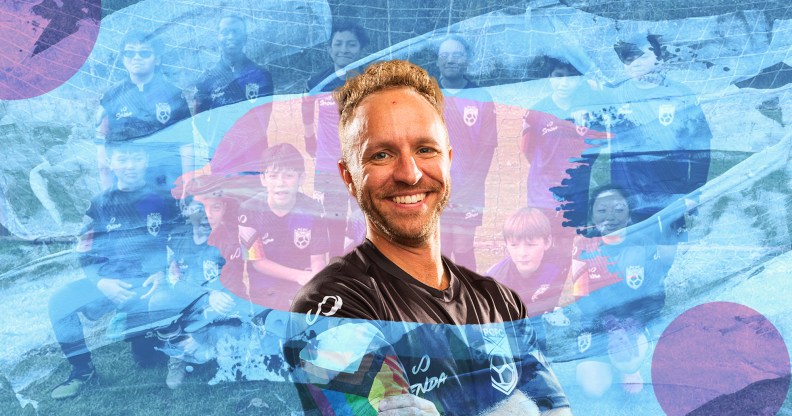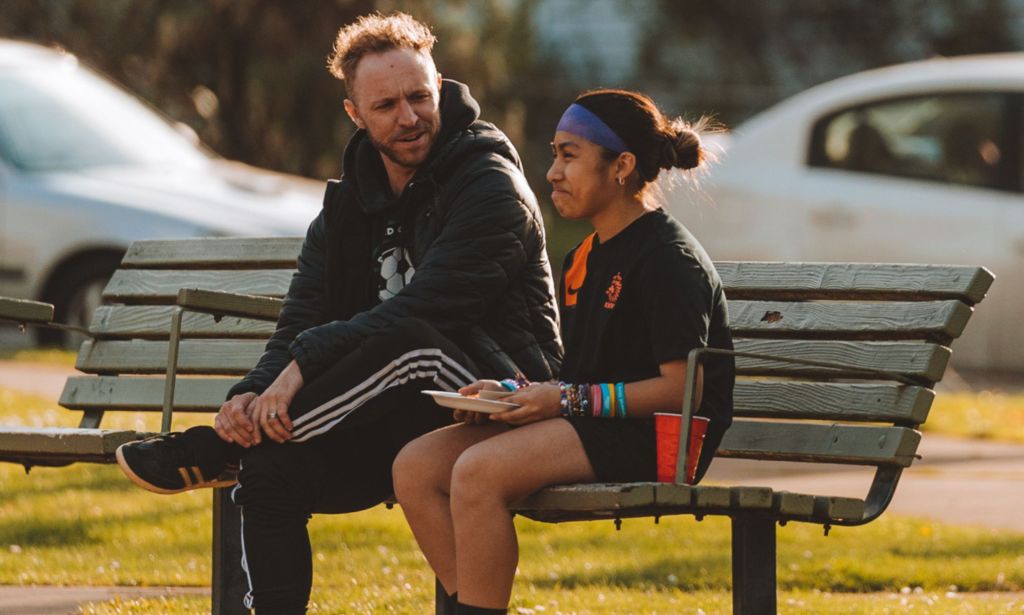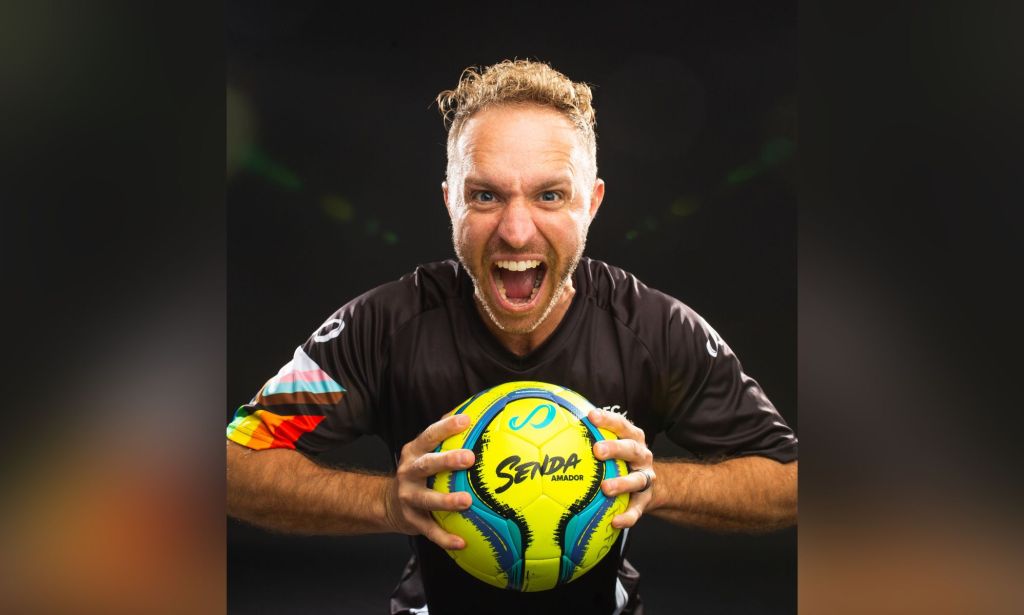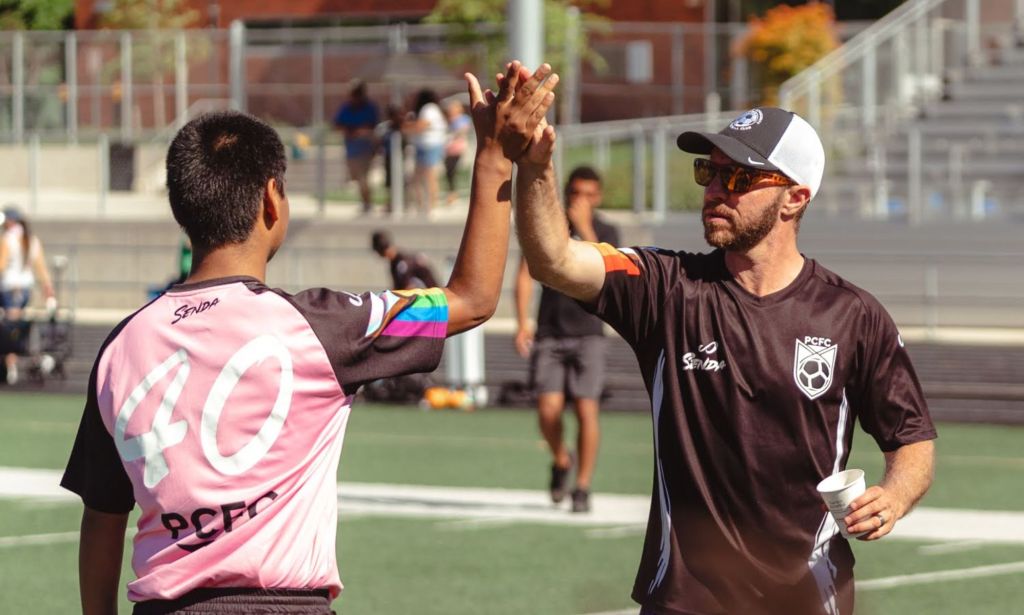Trans football coach explains how sports can be the ‘light at the end of the tunnel’

Kaig Lightner. (Supplied)
Trans sports bans – from anti-trans bills in the US to World Athletics excluding trans women – have a devastating impact on trans youth, says an athlete whose ‘life was saved’ by sports.
Athlete and coach Kaig Lightner started playing football when he was six. While he has “zero memory” of playing at that age, his mum has told him that one of his finest moments was that he “dribbled all the way down the field and scored in the wrong goal”.
From there, Lightner played softball, basketball and volleyball and eventually took up rowing while studying at the University of Washington.
“I just became an athlete right off the bat,” he tells PinkNews. “Amongst all the identities that I feel like I carry, being an athlete is my root identity. It’s the thing that I fall on and go back to all the time.”

For trans athletes like Lightner, safe spaces are becoming rare. In the US, conservative legislators are introducing a wave of bills to prevent trans people from playing on the correct team for their gender. As well as this, a number of global sporting bodies have effectively banned trans professional athletes from competing in women’s sports. This includes FINA, the swimming body, and World Athletics.
It’s something Lightner is counteracting through the Portland Community Football Club (PCFC), which he launched in 2013 to break the barriers to competitive athletic training and opportunity for players and coaches from diverse backgrounds. It’s also a welcoming and affirming environment for LGBTQ+ players, parents and coaches.
Lightner strongly believes he “wouldn’t be here” if it wasn’t for sport. While he sometimes struggled with feeling like he wasn’t “fitting into the rigid idea around femininity” because of his trans identity, the field was a place of “joy and acceptance” for him growing up.
“It was like I couldn’t quite get into a complete space of comfort and letting go of how I didn’t fit in,” he says. “But at least sport was the play I could work through that frustration.”
“And one of the things that is just killing me right now, that’s just hurting my heart about all these things that are going on in the US with the anti-trans athlete bills, is that if I didn’t have sports – even though there was pain that came along with it sometimes – I wouldn’t be here.
“I wouldn’t be sitting here talking to you. I wouldn’t be running this organisation. I wouldn’t be a public figure.
“It saved my life. It absolutely saved my life. My family was my other lifesaver. Thank goodness, I have a family that’s been supportive all along and has shown me so much unconditional care and love …
“But sports was where I found my place of identity. And to take that away from kids because of just their innate being, or being a human being and who they are, it’s mind blowing to me.”

Trans inclusion in sports has become a flashpoint issue in the US
In the past three years, 19 states – a majority controlled by Republican lawmakers – have enacted legislation to ban or limit athletic participation by trans students, most frequently in K-12 schools but sometimes including college.
But trans-inclusion in sports is not a US-only issue. Governing bodies of sports worldwide – including World Rugby, Fina, and rugby bodies in Scotland, Wales, Ireland and England – have increasingly rolled back the ability for trans and non-binary people to participate in the top level of sport.
World Athletics became the most recent global sporting body to implement a trans ban on Thursday (23 March).
The governing body for a variety of sports covering track and field announced new regulations – which come into force on 31 March, Trans Day of Visibility – prohibiting trans women who have gone through puberty before transitioning from being allowed to participate in women’s events.
World Athletics argued the ban was needed to “prioritise fairness and the integrity of the female competition before inclusion”.
However, LGBTQ+ advocates, allies, celebrities, elite athletes and politicians have pointed out that such bans perpetuate harmful gender policing that has plagued women’s sports for ages.
And by limiting trans participation in elite sport, global sporting bodies send the inaccurate and discriminatory message that trans people don’t belong in sports.

Plus, trans sports bans just don’t follow the actual science. Scientists and experts have continuously emphasised that there is no real need to ban trans athletes from sports, and a recent study found trans women don’t have any advantages over cis women when competing in elite sport.
Research has also found that the role testosterone plays in trans eligibility rules in athletics is often exaggerated given that the hormone has little role in performance differences.
Trans sports bans can have a devastating impact on trans youth who want to see themselves represented
Lightner, who came out publicly in 2017 to a gathering of young people that he coaches, says it’s important for young people to know there is joy in being trans at a time when the community is constantly under attack.
He says there were “no positive messages or role models” when he was growing up, and there’s been “some progress” in terms of space for trans people to be seen in sports.
Lightner emphasises that even being able to see one person who looks like them on the field can give hope to trans kids when they need it the most.
“It gives that sense of: ‘OK, there is a light at the end of this tunnel. I can see something that is possible for me,'” he says. “If that’s all that is does for the moment, that can keep a kid going, that can keep them going back to practice and that can keep them going along this path and finding themselves.”
He continues: “That’s what we’re here for. That’s what I’m here for. I’m here to help kids continue to discover themselves and discover all of the amazing things that they have that they don’t even know yet.”
How did this story make you feel?

